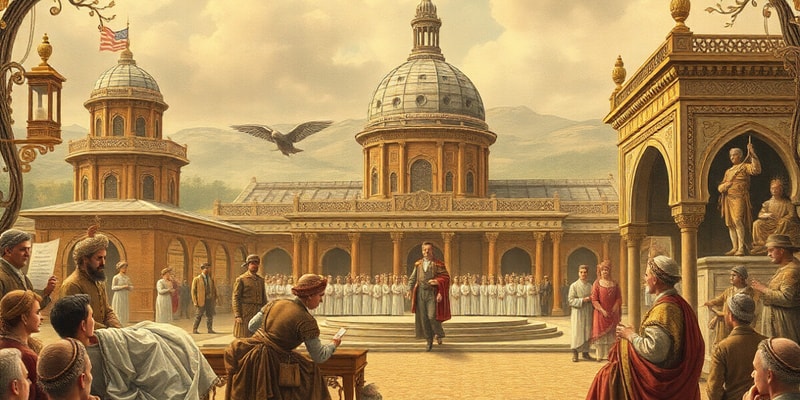Podcast
Questions and Answers
What was the central issue in the Gibbons v. Ogden case?
What was the central issue in the Gibbons v. Ogden case?
What was the ruling of the Supreme Court in Gibbons v. Ogden?
What was the ruling of the Supreme Court in Gibbons v. Ogden?
Which clause of the Constitution was pivotal in the Gibbons v. Ogden decision?
Which clause of the Constitution was pivotal in the Gibbons v. Ogden decision?
What effect did the Gibbons v. Ogden ruling have on the economy?
What effect did the Gibbons v. Ogden ruling have on the economy?
Signup and view all the answers
What prompted the Tripolitan War?
What prompted the Tripolitan War?
Signup and view all the answers
What was one of Jefferson's goals during the Tripolitan War?
What was one of Jefferson's goals during the Tripolitan War?
Signup and view all the answers
How did the Tripolitan War affect U.S. naval power?
How did the Tripolitan War affect U.S. naval power?
Signup and view all the answers
What was one political outcome of the Tripolitan War for Jefferson?
What was one political outcome of the Tripolitan War for Jefferson?
Signup and view all the answers
What prompted Jefferson's actions against Tripolitan pirates?
What prompted Jefferson's actions against Tripolitan pirates?
Signup and view all the answers
What was a key argument Henry Clay made in favor of protective tariffs?
What was a key argument Henry Clay made in favor of protective tariffs?
Signup and view all the answers
What economic consequence stemmed from Jackson's veto of the Bank of the United States?
What economic consequence stemmed from Jackson's veto of the Bank of the United States?
Signup and view all the answers
How did Hull House contribute to social reform?
How did Hull House contribute to social reform?
Signup and view all the answers
What did the protective tariffs of the early 19th century cause in terms of regional relationships?
What did the protective tariffs of the early 19th century cause in terms of regional relationships?
Signup and view all the answers
What was one of Jackson's criticisms of the Bank of the United States?
What was one of Jackson's criticisms of the Bank of the United States?
Signup and view all the answers
What did women involved in Hull House contribute to the broader reform movement?
What did women involved in Hull House contribute to the broader reform movement?
Signup and view all the answers
How did the Industrial Revolution in the Northeast impact Henry Clay's advocacy for protective tariffs?
How did the Industrial Revolution in the Northeast impact Henry Clay's advocacy for protective tariffs?
Signup and view all the answers
What was a significant contradiction in Andrew Jackson's presidency?
What was a significant contradiction in Andrew Jackson's presidency?
Signup and view all the answers
What role did settlement houses like Hull House play during the Progressive Era?
What role did settlement houses like Hull House play during the Progressive Era?
Signup and view all the answers
Study Notes
Gibbons v. Ogden (1824)
- Supreme Court case addressing a steamboat licensing dispute.
- Ogden (New York license) vs. Gibbons (Congress license).
- The Court ruled in favor of Gibbons.
- The Commerce Clause (Constitution) gives Congress authority over interstate commerce.
- New York's monopoly was unconstitutional.
- Strengthened federal authority and encouraged free interstate trade.
Tripolitan War and Jefferson's 1802 Orders
- Barbary States (N. Africa) demanded tribute for Mediterranean trade.
- The U.S. refused, leading to the Tripolitan War (1801-1805).
- Jefferson authorized the Navy to protect American commerce.
- Aim: To ensure secure trade routes and protect U.S. sailors and goods.
- Established U.S. naval power and defended trade interests.
Henry Clay's Advocacy for Protective Tariffs (1824)
- Henry Clay advocated for tariffs to protect American industries.
- Tariffs tax imported goods to favor domestically made products.
- Argues for economic independence and federal revenue.
- Benefited the North (manufacturing) but negatively affected the South (agriculture) due to higher import costs.
Andrew Jackson's Veto of the Bank of the United States (1832)
- Jackson vetoed the Bank's recharter, dismantling the national bank.
- Viewed the bank as undemocratic and a tool for elites.
- Redistributed federal funds to state banks (pet banks).
- His actions led to economic instability (e.g., Panic of 1837).
- Championed the common man, but used executive power significantly (e.g., Indian Removal Act).
Hull House and Female Reform in the Late 19th Century
- Hull House (Chicago) provided social services to immigrants.
- Founded by Jane Addams, to help immigrants.
- Led by middle-class women as part of a reform movement.
- Similar to the Second Great Awakening, emphasizing moral reform and social uplift.
- Supported the Progressive Era's focus on addressing industrial problems.
- Expanded women's roles in public life.
Thematic Overlaps
- Federal vs. State Power: The Gibbons v. Ogden decision (federal authority) contrasted with Jackson's Bank Veto (states' rights).
- Economic Growth and Sectional Tensions: Protective tariffs prompted economic competition between North and South.
- Social Reform: Settlement houses like Hull House exemplified larger Progressive Movement efforts for social justice.
Studying That Suits You
Use AI to generate personalized quizzes and flashcards to suit your learning preferences.
Description
Explore significant historical events that shaped U.S. trade and commerce, including the Gibbons v. Ogden Supreme Court case, the Tripolitan War, and Henry Clay's push for protective tariffs. This quiz examines the impact of these cases on federal authority and American trade practices. Test your knowledge on how these events influenced the economy and commerce in the early 19th century.



